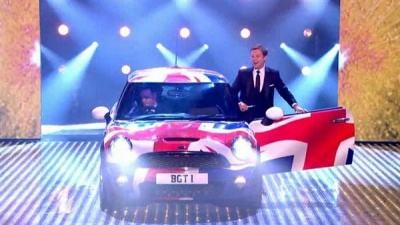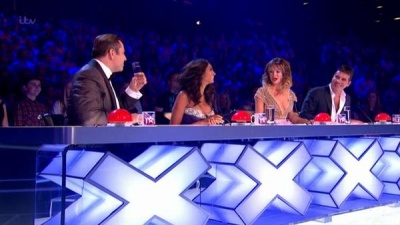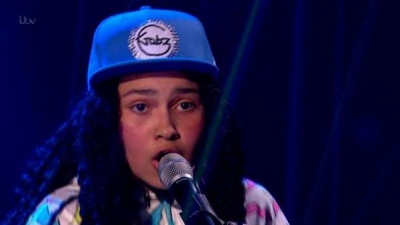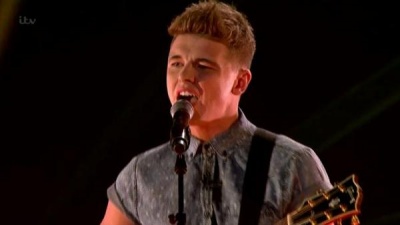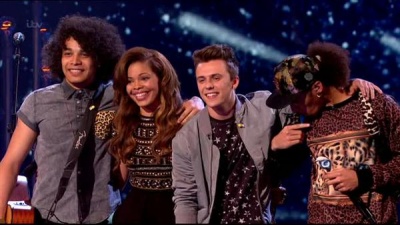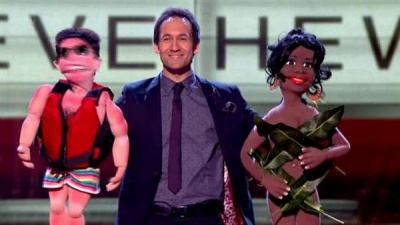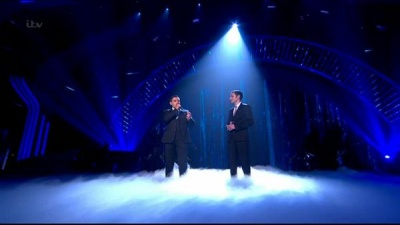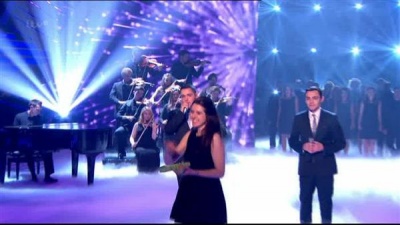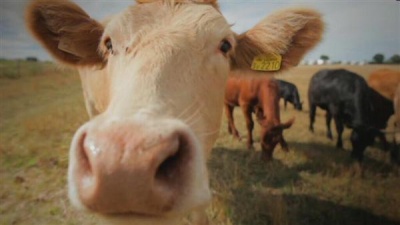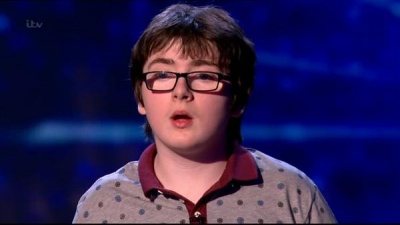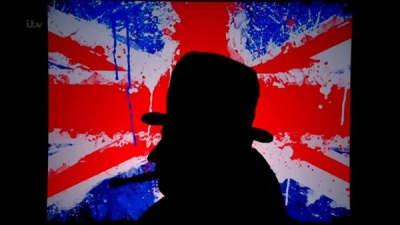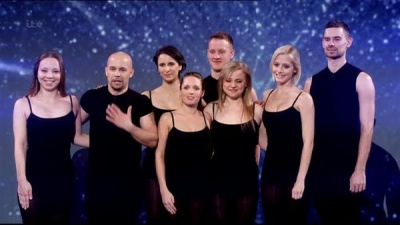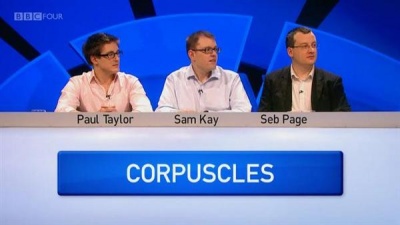Weaver's Week 2013-06-16
Last week | Weaver's Week Index | Next week
Apparently, we have Debra Stephenson to thank for all of this. Back in 2005, Simon Cowell was watching Comic Relief Does Fame Academy, and saw Ms Stephenson give a very average performance of the torch song "Get here". In his inimitable way, Mr. Cowell thought, "Actually, I'd rather be watching a performing dog." According to the Cowell myth, this thought begat .. Got Talent, and the dream came true last year with Pudsey and his trainer Ashleigh Butler.
But performing dogs are so last year. Join us as we reflect on the 2013 final of Britain's Got Talent. We try to tell the Peter Brame from the Paris Campbell-Edwards, the Alistair Griffin from the James Fox. We wonder who will be as welcome as Richard Park at Patrick Kielty's party, and whatever happened to Alex Parks?
Contents |
Britain's Got Talent
ITV, 8 June 2013
The show's opening features hosts Ant and Dec driving a Mini car, painted in the pattern of the Union Jack. Flag-waving patriotism, isn't that also a bit 2012? Apparently not, because they go down a storm. Antan Dec's presentation hasn't changed since we last looked at Britain's Got Talent, back in 2007: mildly cheeky, funny without ever being offensive, Dec still looking for the right girl, and never threatening to overshadow the act they're introducing.
The critical panel has changed from our last look-in. Amanda Holden has been an ever-present on the judging list, though we're completely stumped for a reason why. Simon Cowell is also on the panel, situated at the far right as we look at it. All the better to reach down and feed treats to the performing dogs on the show tonight. (SPOILER: There will be no performing dogs, or animals of any variety, on this broadcast.)
Piers Morgan has been run out of town. We cannot begin to tell you how sad an event this is. Such is the stature of this critic that he had to be replaced by a person and a mechanical device: Alesha Dixon from Strictly Come Dancing, and Sam the Lift from Incredible Games.
We can gloss over the bottom half of the results quite quickly. Five very young acts made the final. Asanda and Arisxandra were young female soul singers, both using the vocal trembles (melisma, that's what they call it) beloved of Leona and Beyonce. We reckoned Arisxandra had some good vocal control, and could develop into a strong performer. Asanda relied heavily on the backing choir, but the deficiencies didn't warrant the judges calling her "a freak" and "ridiculous". Ah, that's why they keep Amanda Holden on the panel: to throw around gratuitous and inaccurate insults.
Also young and in the bottom end were Pre-Skool, the opening act of prancing kiddies. Reminded us a bit too much of Channel 4's Minipops. Jordan O'Keefe strummed the guitar and sang, we'd forgotten about him almost before he'd finished. Gabz Gardiner did stand out as A Bit Good: a young urban singer-songwriter, hip-hop tunes played at the piano. A little more development, some mentoring from experienced people, this talent could go far.
But here we come up against the first problem of Britain's Got Talent: it's a shop window, not an incubator for talent. Acts on this programme are expected to have learned their trade already, to impress a theatre full of people, to charm the panel of critics. These are the gatekeepers, the people whose whims cause opportunities to be made and missed.
Mr. Cowell and the others argue that they're looking for raw talent and potential, with their stars coached before the live shows. This is true; this misses the point. Britain's Got Talent could be just one stop in a long career. For too many potential talents, it's the beginning and the end. We don't see evidence of follow up by the entertainment industry in general, by Mr. Cowell in particular. Gabz has a lot of potential, Arisxandra could develop into a great singer, but they're not going to get this help. Mr. Cowell has strapped himself to a conveyor belt, he's already on to his next project, and doesn't much care about the talent left behind.
Deservedly in the bottom two was the more established performer Francine Lewis. Impressions are her trade, but we found her routine to be staid and predictable, relying on hackneyed clichés like Janet Street Porter has got big teeth. The climax was a song in the style of Katie Price. The only problem: we're still scarred from seeing Katie Price perform on A BBC Song Against Europe 2005, it's not a memory we care to have brought back, and the original was far scarier than this limp effort.
This year, there was a week's gap between the semi-final and the final, allowing ITV to honour its commitments to show men kicking a plastic bag around a field. Researchers used this week to good effect, unearthing Francine's prior work. A finalist in Jonathan Ross's The Big Big Talent Show, one of the team captains on Night Fever, apparently a regular booking on Loose Women. If we're to believe some of the chatterati, this is a major scandal. Er, no. British television has room for about three impressionists at a time, and those roles are filled by Alistair McGowan, Ronni Ancona, and Rory Bremner. Lesser lights – and we must put Francine Lewis in this category – will be squeezed out of the hyper-competitive market. That's showbiz.
The week's gap also allowed ITV to cross-promote the Britain's Got Talent final everywhere else on the network. Taking full advantage of this opportunity were the Luminites, a four-piece band who were bubbly and giggly and brought a little something to all the shows. They appeared on Richard and Judy, on Good Morning Britain, on After Noon Plus, and would probably have made a guest appearance on Tipping Point had any of them been small, round, and flat.
Allowed to sing one tune on the final show, they went for a re-working of "Hurts so good". It was decent, it was reasonable, it was clear that they were capable of something a bit better than this but weren't going to be able to perform it on the night. Luminites were the first act in this list who had us thinking they owned the stage, at least for a few minutes. We rather hope to come across them again, because fifth in the final is neither here nor there.
Astute readers will have noted that we've already discussed five performers whose only act is to sing. The Grate British Public put through a lot of singers this year, perhaps showing that the "variety" format is wearing thin. Perhaps it shows that the GBP has been trained in how to spot a talented singer and a talented dancer, but is less confident to tell the difference between an impressionist and a performing dog act.
To ensure better variety, one of the performers who came third in their semi-final was put through by decision of the judges. The show's official narrative is that this is a second chance to someone who missed out by a bad draw. Our suspicion is that the additional act is chosen to make the final a better television show. There's absolutely nothing wrong with that, we'd prefer it if the BGT organisation could come out and say it.
This year, the additional spot went to Steve Hewlett, a ventriloquist. His routine surprised with its quality, featuring appearances by Puppet Simon Cowell and his lady companion Puppet Sinitta. It's clear that Mr. Hewlett has honed his skills through performances at holiday camps and student bars and the like, because ventriloquism on television is a museum piece. As good as he was, we don't expect to see much of this talent on the box, though we do hope he can sell out a bigger theatre for the next few years. Indeed, he came within a few thousand votes of a top three place, which might have made the ITV commissioners think about a one-off special late in the summer.
We'll pause for the interval acts. Psy was an internet video sensation last autumn, he did an energetic song-and-dance routine to a song that wasn't the one that made him famous. There was a montage of the series so far, and there was a performance by Taylor Swift and Ed Sheeran, doing their new (and somewhat dreary) number. After their performance, Mr. Sheeran confessed to his criminal record, and you can also buy a copy of "Psyche!", the greatest hits of PJ and Duncan AKA. You can, but perhaps you shouldn't.
Which brings us to Richard and Adam, who finished in third place. These two tenors performed "The impossible dream", from the musical "Man of La Mancha". That musical lives with one foot in reality (Cervantes is in prison, expecting to be questioned by the Spanish Inquisition), and one foot in fantasy (he lives the character of Don Quixote, giving Quixote his own fears and hopes). Quixote himself is a further fantasist, an old man who pretends that he's a dashing knight, rescuing the damsel in distress. There are about three levels of recursion, we're a bit confused, and we suspect that a less sympathetic portrayal would be Mitchell and Webb's tragi-comic character Digby Chicken-Cesar.
Now, "Man of La Mancha" was a product of the 1960s, and rode that era's blind optimism, an idealist riding slightly above the conflicts of a society tearing itself apart. In this work, "The impossible dream" is performed by Cervantes as Quixote, explaining how he has eternal hope, how he might be beaten back but will not be giving up. He has his dreams, he wants to bring them into action, and even if he's not going to succeed, he's going to give it a dashed good try. In its place, it's a deep and meaningful song.
For the final of Britain's Got Talent, it's a nice song. One that Richard and Adam can sing. Who cares about the back story, never mind the heritage, not when two tenors are going to sing for your entertainment. To be frank, we found this to be one of the most tedious performances of the night. Two blokes are standing on the stage, they're singing a well-known song. And that's it. They aren't conveying any emotion, they're not demonstrating that they understand the meaning, their vocal performance is adequate at best. This performance is going downhill terribly quickly, and we cannot wait for it to come to its welcome end.
And then there was a woman on stage throwing eggs.
A woman. On stage. With a big grin on her face, a box of eggs in one hand, and a throwing arm dispatching the contents, one by one, in the direction of Simon Cowell.
Of course, this is too good to last, and she's bundled away within ten seconds. Ant will tell us, "That wasn't part of the performance." For the contest, this was true, it's not something on which the public should vote. But it happened, it's been seen by 10 million people on live television, and it was as much a part of the show as the tedious, passionless vocal music. The protester – a performer in the backing band – later put out a statement saying how annoyed she was with Mr. Cowell, how he was helping to kill talent and music in the UK. She was determined to bring this to the public's attention, and apologised for hijacking Richard and Adam's moment in the spotlight.
We've thought about it, teased out the meaning, and we reckon that the protester heard "The impossible dream" and interpreted it in her own way. She has beliefs, she's prepared to stand up for them, even at the expense of her career. Simon Cowell heard "The impossible dream" and thought, "nice song".
It would be impossible to cut out the egg throwing incident from the record of finals night. The critical panel commented as much on that as on the formal performance, saying how well Richard and Adam had reacted to that unplanned event. Resident insult machine Amanda Holden described the egg-laden protester as "a cow", exposing again her woeful ignorance of farmyard animals.
"I was going to come on stage and throw some eggs. But that's been done." The opening line from comedian Jack Carroll, who finished second. It's brave for any performer to extemporise, to deviate from the script they've written and rehearsed. For an amateur comedian to do that on live television, in front of 10 million people, is brave. Or foolhardy. Or possibly both.
Jack Carroll's performance was worthy of second place. It was good, it was very good, but there was something better in the contest. Jack has a slightly ponderous speech delivery, the more swift-witted in the viewing audience are able to reach the punchline a moment before he does, and he's not yet learned to defeat that expectation. We also found his routine sagged in the middle: it had a cracking opening, a strong finish, but he seemed to lose his place between. Still, there's nothing that can't be ironed out through a little bit of practice, and we will not be surprised to see him on the box again before the year's out. And when we do, he will be better.
We will be seeing Attraction again, they're going to the ITV Variety Performance. The troupe perform shadow dancing: take a screen, project a pattern onto it from behind, then put themselves in the path of the light so as to form an image. And not something simple like a person: these people are able to form themselves into the shape of a lion, or Winston Churchill (complete with cigar). It's a mesmerising act, one that has to be seen to be understood.
Each year, there are one or two acts who come through the bubble of babble and make themselves known during the audition process. From us, this year, Attraction was this act: people who saw the heats and the semi were raving about the marvellous shadows. It is a wonderful performance, but we fear that it's not one that bears a tremendous amount of repetition. We'd watch a five-minute show, we might bear a fifteen-minute routine, but that would be about it. There's going to be a market for a video each year, certainly for a live tour, but television might not sustain this very visual performance.
And each year, there's criticism that some of the acts are not British. Again, Attraction fit that bill, being based in Hungary, and having competed in at least two versions of Got Talent on the continent, and having gained experience as though that were in some way cheating. Quite honestly, who cares. They put on the best show of the night, they met the challenge in a way none of the other acts did, and they won fair and square. They got half as many votes again as Jack Carroll, twice as many as The Egg Boys and the ventriloquist, the rest were nowhere.
So that's Britain's Got Talent. A show we'll remember more for the unscheduled events than the scheduled ones, a show that might have found three acts with potential, but will only develop two, and we'll be lucky to see one in a year's time.
And one question remains. The key point of Britain's Got Talent is the big X marks above the stage, the buzzers that the critical panel can press to terminate an under-performing performance. Not once during this final was a button pressed. How are the judges doing?
Only Connect
Series 7, heat 5: Corpuscles v Cartophiles
It's G & T tonight.
Not in the minibar in the host's dressing room, at least not when she's finished the filming day. No, this is the draw unwinding itself with two sides who didn't win their opening matches.
"Do you know what happens if you win tonight?" asks the host. "No," replies the captain of the Corpuscles. This is a shame, someone should know this. We think the winners go on to play the losers of match Purple 13, the losers are invited to help Amanda Holden tell the difference between cows and chickens. It's walls 298 and 299.
Pictures straight away for the Cartophiles, they get Rays for 2. "Holiday Armadillo" is a dead giveaway in the Corpuscles' set, securing them three points for Friends episode titles. 3-2, then.
The Cartophiles also score two on their next question, with various linguistic terms for space explorer. The Corpuscles also score three on their next question, descriptions of people nicknamed "Fat". 6-4.
For the next set, Cartophiles have various named animals; they go with animals predicting sporting events, but they weren't all sporting, and that goes across for a bonus. The Corpuscles have a music question, are completely blank, and guess at fire. Titanium and Any old iron and Heart of Gold is another bonus. Corpuscles lead it, 7-5.
Into sequences, where Tiger Bay is followed by Mandaly and Bombay. And then the penny drops: Ian Dury's song "Hit me with your rhythm stick". Not San Jose, not Friday, but Santa Fe. They'd have got it as a team of six, reckons Victoria. Now, where are the Corpuscles? They're on a BBC FOUR quiz, and correctly describe the channel logo: white writing on a black background. Two points. 9-5.
For the Cartophiles, it's American Football = 60. They then reckon it's field hockey = 70, and rugby = 80, so sound the Five Point Klaxon! They're guessing at association football = 90. They're right to guess that, it's worth Five Points! Quick round of applause. Then on to the Corpuscles, who have things with five, four, three heads, and guess at Simon and Garfunkel. The question editor prefers Zaphod Beeblebrox, but it'll do for two. 11-10.
Pictures for the Cartophiles: spelling out spring – forward – fall – back, and three points. And three for the Corpuscles, on a question about the internet search wars. 14-13, and we're wondering why there's no love for Altavista or Clusty any more.
On to the walls, where the Corpuscles start with types of mint, bounce off radio DJs, there are football teams, horsey terms, Jilly Cooper novels. Lots of ideas, lots of jabbing at the wall, but absolutely nothing is coming out. They finally secure a set of sports done on horseback, and the links: original Radio 1 DJs, mints, and Jilly Cooper books. Finding them proved the challenge. Five points!
For the Cartophiles, there's some postcodes, groups of countries, nicknames of TV shows, and that comes out on about the fourth iteration. Then geological formations, terms for rich people, and groups of country. Bish bash bosh. Ten points!
That's put the Cartophiles ahead, 23-19, going into the Missing Vowels round. Losers here will, apparently and actually, be going home. Resins is the first set, and the Cartophiles do their best to turn the game around, losing that round 3-(-2). They pull back in French actresses, winning 3-1 and re-taking the lead. George Gershwin compositions ends up a 1-1 draw with two panel-beaters. Methods of random selection is with the Corpuscles by 2-1.
The end of the round, but not the end of the contest. 26-26. For the tie-break, it's captains only. One clue, one buzz, one answer: one wrong answer sends the team home.
It's a long time before anyone buzzes. It's almost as long as the gap between the buzzers on Britain's Got Talent.
After an agonising wait, the Cartophiles buzz. "So long, and thanks for all the fish" is their answer. It's the right answer. They progress, and University Challenge champion Sam Kay leads his team back to Oxford.
More teams seeking a win next week: General Practitioners and Festival Fans go hammer-and-nail.
This Week And Next
Two footnotes from the Britain's Got Talent writeup. Simon Cowell has said he wants to be involved with next year's Eurovision Song Contest, and wants to find the "right artist" to represent the BBC. Simon, mate, the clue's in the title. Song contest. And also: whatever did happen to Alex Parks? Our searches are coming up blank; we hope she's happy, whatever she's doing.
Sad news from Greece, where state broadcaster ERT has been closed down by diktat of the government. We're not going to go into the rights and wrongs of this, only to note that it's unlikely that any replacement broadcaster will be allowed to enter Eurovision competitions for the next year. And it leaves one great question: where will Cyprus donate her twelve points?
Our Texas correspondent reports changes in their local talent show, Pop Idle Us. It used to go out on ITV2 to an Only Connect-sized audience, but now goes out on 5* to an audience about a quarter of the size, and trails thirty-year old editions of Bullseye. Disappointed with this catastrophic fall in ratings, the producers have decided to "let go" Nigel Lythgoe, freeing him to concentrate on his dancing show. The replacement is Per Blankens, imported from Pop Idle Sweden. Suggestions that he was the Middle Dancing Meatball in the recent interval act were completely invented at press time.
Ratings in the week to 2 June 2013, including a holiday Monday that was actually sunny. (Ha! Fooled the weather!) Britain's Got Talent led, with 9.5m seeing Monday's performances, 7.6m the results. The Apprentice led on BBC1, with 6.9m seeing the teams mess up; 6.75m for The Voice, and 4.4m for HIGNFY. Catchphrase took 3.15m viewers, and The Chase (2.85m) just beat The Apprentice You're Fired (2.75m).
Come Dine with Me was Channel 4's biggie, on 1.25m, just ahead of Britain's Got More Talent on ITV2 (1.05m on Saturday), Only Connect on BBC4 (895,000), and then Gory Games on CBBC (390,000, tying with BBC4's much-promoted sitcom Up the Women). Of note: Splatalot (305,000) and Masterchef India (300,000) beat Come Dine repeats on More4 (250,000). And BBC Parliament's coverage of the Coronation had 110,000 people tuning in. Accounting for inflation, that's the equivalent of 2.4m viewers today.
Culture leads the way next week, with BBC Cardiff Singer of the World (BBC4 and BBC2 Wales, from Monday). There's also a new series of Britain and Ireland's Next Top Model (UK Living, 8pm Thu), and the snappily-titled Big Brother Bit on the Side: Rylan's Supersized Celebrity Sunday (C5, 1.10 Sun). Next Saturday pits the final of BBC The Voice of Holland of UK against Joe McElderry pitting his wits against Who Wants to be a Millionaire and against the Song Prize in Cardiff. Which singer will win? Will anyone care?
To have Weaver's Week emailed to you on publication day, receive our exclusive TV roundup of the game shows in the week ahead, and chat to other ukgameshows.com readers, sign up to our Yahoo! Group.

